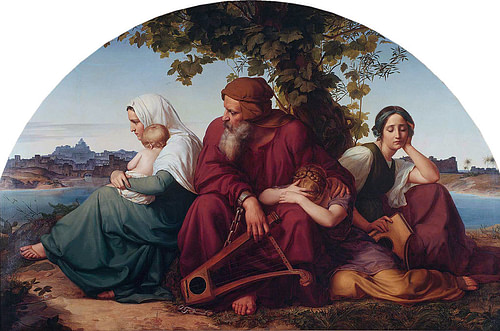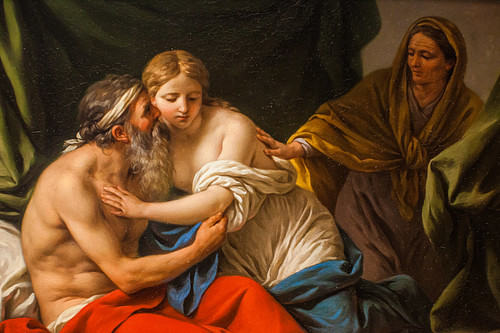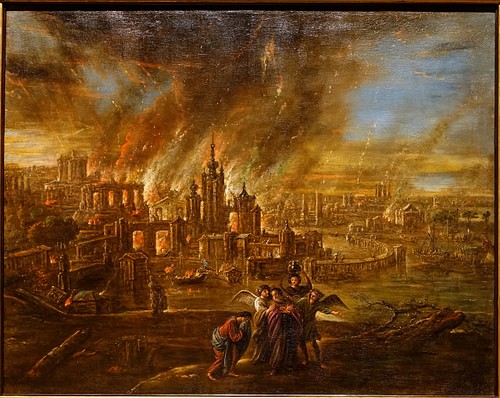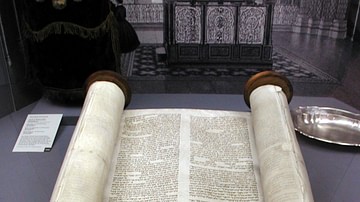
The Book of Genesis is the first book of the Jewish scriptures and the Old Testament of the Christian Bible. Genesis takes its name from the opening line in Hebrew – beresit, ("in the beginning") – later translated into Greek as genesis ("origin"). Genesis is the first text of what eventually became designated the Pentateuch, the Jewish Torah ("teachings"): five books of the Laws of Moses.
The Documentary Hypothesis
Genesis consists of a variety of literary details: myth, hymns, prayers, sacrifices, rituals, oracles, folk tales, and historical narratives. Tradition claimed that the first five books were written down by Moses, who passed them to his general Joshua when the Israelites arrived in Canaan from Egypt. In the 19th century, the social science disciplines of archaeology, anthropology, and sociology emerged and were utilized to study ancient civilizations and ancient texts. What is noteworthy in Genesis is that several of the stories are repeated, but with varying details. At times, the God of Israel is referred to as "Lord," but at other times as "God almighty." When this occurs we also find theological differences, as well as indications of changing historical contexts that included politics.
After the period of the united monarchy under King David and his son, Solomon (c. 900 BCE), two separate kingdoms were created: the Northern Kingdom of Israel and the South Kingdom of Judah. A way to explain the formation of the text was proposed by Julius Wellhausen (1844-1918), who taught at the University of Göttingen in Germany, in what became known as the Documentary Hypothesis. As we do not know who actually wrote the biblical texts, the various elements were assigned to a source:
- J, the Jahwist, or Jerusalem source
The Hebrew name of God (revealed in the book of Exodus) consisted of four consonants, YHWH ("I am that I am"), described as the tetragrammaton. We have the German J, for the pronouncement of the Y sound. The later Masoretic version added vowels, which gives us the English version, Jehovah (which does not appear in the Bible).
The J source utilized anthropomorphic portraits of God; "the face of God," "the hand of God." In these texts, God often visits the earth. - E, the Elohim source
The E comes from a form of the Canaanite el, pluralized as representing several aspects of the godhead, but also from the tribe of Ephraim, settled in the Northern Kingdom of Israel.
The E source portrays God as a more abstract being who does not come to earth, but communicates through angels. - P, the Priestly source
The P source is a collective term for priestly concerns. This includes the sacrifices, rituals, hymns, prayers, and the begats of Genesis. The Hebrew begat ("brought forth") was the term for procreation. All ancient cultures emphasized bloodlines in detailed genealogies. This validated concepts and practices handed down through the generations. In oral cultures, the repeated lists of the begats may have been a way to memorize oral traditions. - D, the Deuteronomist source
This source was named after the last of the five books assigned to Moses (Deuteronomy). It is a collective term for the final form of the traditions that were written down. In 722 BCE, the Neo-Assyrian Empire invaded the Northern Kingdom, and refugees from the North migrated to Judah. This may be when northern traditions were first joined to southern traditions, combining the J and E sources.
In 587 BCE, the Babylonian Empire invaded Judah and destroyed the Temple of Solomon. At that time, some Jews were taken captive to the city of Babylon. This period is known as the Babylonian exile." The theory is that the "Deuteronomist," either a person or school of scribes, completed the final redaction, or editing, of all the combined sources while in Babylon, beginning c. 600 BCE, but with further editing over the next several centuries (in a range from 538-332 BCE).

Oral Tradition & Dating
Antiquity was always honored and respected, despite what appears as contradictions. Genesis opens with two versions of creation, P and J; there are two versions of the story of Noah and the flood. The final version may have been an attempt to maintain different oral traditions so that they would not be forgotten.
Oral traditions, by their very nature, are difficult in relation to historical dates. Rather, scholars rely upon details of the stories for historical context. A consensus dates the original stories in Genesis to c. 1800-1400 BCE. The stories reflect nomadic life in the Middle East and Egypt in the late Bronze Age.
The paradox of Genesis is that with its claims of "origins," it assumes that we have the first articulation of what became Judaism. But in reality, it may have been one of the last books to be finalized. We describe the process as "reading back" elements into the story. For example, Genesis has Abraham and others constructing altars and sacrificing to God at different sites where they had revelations. However, the instructions for altars and sacrifices are first narrated by Moses in the later book of Exodus. Moses repeatedly claimed that God would choose only one place for the rituals, the later Temple cult in Jerusalem, detailed in the later book of Leviticus.
Creation Story
The first 11 chapters of Genesis are described as myth, as they function like all myths to explain the origins of the gods, the material universe, and humans. Scholars designate these chapters as "primal history." Unlike other creation myths, Genesis does not describe the origin of God, but it shares the concept that creation arose out of chaos and the waters of the deep. Genesis also contains polemic, a critique against other views.
An early Mesopotamian myth of creation, the Enuma Elish, described the gods as chaotic and capricious. Humans were created solely as slaves for the gods. In contrast, creation by the God of Israel was constantly described as "good." Other male and female goddesses often had intercourse with humans; the God of Israel does not procreate, but creates through speaking.

Then God said, "Let us make humans in our image, according to our likeness, and let them have dominion over the fish of the sea and over the birds of the air and over the cattle and over all the wild animals..." ... God blessed them, ..., "Be fruitful and multiply and fill the earth and subdue it and have dominion over the fish of the sea and over the birds of the air and over every living thing that moves upon the earth.” (Genesis 1:26-28)
In Genesis 1, God created male and female simultaneously. The phrase "Let us ..." raises the question of whom God was talking to if only animals existed. Religious systems are social constructions. Ancient cultures had kings who had a court of advisors. The prevailing theory is that God is talking to his court, consisting of angels. Genesis does not relate the creation of angels. It is also understood as the royal "we."
"In our image ... " raises further questions: Does God look like us? Do we look like God? Debates continue, but a common theory is that "the image of God" may refer to governance. As God rules over the universe, humans are to rule over all living things on earth.
Adam & Eve
Genesis 2 begins another creation story, with God creating Adam and then Eve from Adam's rib. They had access to everything in the Garden of Eden with the exception of "the tree of the knowledge of good and evil" (Genesis 2:9). All ancient religions included a fall story, which served two purposes: this explained how and why evil entered the world and why humans died. The Jewish story introduced the character of the serpent, which later evolved into the Devil. Narratively, however, the role of the serpent was to introduce the concept of human choice. Adam and Eve chose wrongly.
Descriptions of God include omnipotence and his omniscient ("all-knowing") nature. So, why did God not know that Adam and Eve would disobey? Never stated in Genesis, later interpretations by both Jews and Christians claimed that God did not want slaves; he gave humans free will.

The function of this story is to explain the evolution of later society, as described in their punishment: men have to toil for a living and women have pain in labor and birth. These are described as etiologies, causation. The ultimate punishment, however, was their loss of immortality; this is why humans die. It should be noted that there is no mention of the "original sin" through intercourse in Genesis. The Christian concept of human sexuality as sin was created by bishop Augustine of Hippo in the 4th century CE.
Foundation Stories
Genesis 6-11 include several other foundation stories. God regretted the creation of humans because of evil on the earth. Several cultures had similar stories: the Egyptian sun god Ra attempted to eradicate humans; the Mesopotamian Epic of Gilgamesh has the gods sending a flood because of the clamor and noise of humans; Greek mythology had the story of the flood survivor, Deucalion. The story of Noah and the ark shares common elements of flood stories (exceptional rains and overflow of river systems).
After the flood, the word is repopulated with Noah's descendants, in a list of "the nations" of the earth, with the "begats" of each generation. Genesis 11, is the story of the Tower of Babel. Humans attempted to build a tower that would reach the heavens, but God created the various languages (babel, "confusion") so that they could never cooperate in a similar venture.
The Ancestral History
The main purpose of Genesis begins in Chapter 12, with the call of Abraham. Abraham hears a voice from the God of Israel telling him to take all his family and clans and move to the land of Canaan, where God will make him the father of a great nation. This is what the name "Abraham" means. He was promised that his descendants would be "as numerous as the stars in the sky and as the sand on the seashore" (Genesis 22:17). This is known as the covenant with Abraham. Covenants were essentially a contract between the divine and humans, spelling out what was expected of each. Abraham and his descendants were to be loyal to this God in return for his protection and granting them prosperity. Abraham was thus the founding ancestor of the Jewish nation.
The plot tension, what motivates the characters of a story and moves the plot along, in the story of Abraham begins with God's promise. But this promise of progeny is belied by the fact that Abraham and Sarah are old, and Sarah is barren. The rest of the book of Genesis centers on the problem of God fulfilling his promise of a nation (descendants) for a couple in this state. Throughout Genesis, many women are deemed barren. This is not because they had sinned. It is a literary device for having God involved in fertility by way of divine intervention. Many of these women who are barren receive an annunciation (either from God or from an angel) telling them that they will eventually become mothers. The annunciation text predicts that the son (it is always a son) will be a great person or an instrument of God's divine will.

Sarah told Abraham to sleep with her Egyptian slave, Hagar, and Abraham agreed. As slaves in the ancient world were the property of their masters, this was not adultery (technically "violation against a man's property"), but an ancient version of surrogate motherhood. When Hagar became pregnant, the child was legally the child of Abraham and Sarah. Hagar gave birth to Ismael. Ismael was not the 'son of the promise', but Hagar was told that he would also become 'a great nation'. Ismael became the ancestor of the Arabs.
The Sign of the Covenant
Covenants were often accompanied by a sign. Genesis 17 contains another covenant. It repeated the promise to Abraham but now commanded a sign of this covenant: circumcision, the removal of the loose foreskin of the penis. Many ancient peoples practiced circumcision. Many people assume that it was a hygienic measure, but most ancients did not understand diseases and germs. What we can know about circumcision is the way it functioned. Circumcision was a permanent, physical marker of tribal affiliation.
Sodom & Gomorrah
One of the best-known stories from Genesis is the destruction of Sodom and Gomorrah. Three angels visit Abraham in his camp and tell him that they are going to destroy the cities because of "How great is the outcry against Sodom and Gomorrah and how very grave their sin!" (Genesis 18:20).
Abraham's nephew, Lot, lived in Sodom. When the angels arrive, he offers them hospitality in his house. The men of Sodom then surround it and demand that the angels be sent out so that "we may know them," a euphemism for sexual intercourse (Genesis 19:5). However, the text is not quite clear. Hospitality was an ancient concept of offering aid even to strangers, on the understanding that you may need aid from strangers at some point. Was the sin of the men the violation of hospitality or the ultimate English concept of sodomy, anal intercourse between men? This was condemned in ancient Judaism, as it upended the command to procreate and wasted the seed of life, the semen (Leviticus 18). Sodom and Gomorrah were destroyed by fire and brimstone. Lot fled with his daughters and continued the line of Abraham. In modern debates concerning homosexuality, this story continues to be cited by some Christians as a "sin."
The Sacrifice of Isaac & the Patriarchs
Sarah eventually gave birth to a son, Isaac. God then ordered Abraham to sacrifice him, but at the last minute, an angel of the Lord stopped him. Scholars and theologians have debated this story for centuries. Was this Israel's story about forbidding human sacrifice? Some ancient cultures did practice this, most often with prisoners of war. It may also reflect a later legislation that "first fruits" (crops and herds) were to be offered (devoted, literally sacrificed) to God. Was this story a clarification that "first fruits" did not include sons? What we can conclude from this story is that it functioned as a demonstration of the obedience and faithfulness of Abraham.
The rest of the book of Genesis narrates the stories of his descendants, starting with Isaac's son, Jacob. Jacob is important for two reasons; his wrestling "struggle" with God resulted in a new name for Jacob, that of "Israel" ("he who prevails"), and his twelve sons (through two sisters, Leah and Rachel, and some slave women) became the twelve tribes of Israel, collectively known as the patriarchs ("founding fathers"). The narrative contains details of the sons of Leah and Rachel, as well as their intermittent times of barrenness, explaining that slave women were also the mothers of his children. The details may relate to the later settlement of the tribes in Canaan, to rationalize which sons obtained particular areas of land depending upon their rank in the birth order and the status of their mother.
Genesis has several stories of why Jacob's eldest sons did not inherit the mantle of lineage; this fell to the fourth son, Judah. Again, reading back: King David was of the tribe of Judah, and this story validated his claim to the concept of kingship in Israel.
Genesis 23 reports the death of Sarah and Abraham's buying of a burial plot in the cave of Machpelah (modern Hebron). It was freely offered, but Abraham insisted on paying "four hundred shekels of silver" (Genesis 23:15). Burial plots validated ownership of land; this passage remains important for claims of the early settlement of Jews in Israel. Subsequently, the other patriarchs were also buried in the tomb, which is now a shrine divided between Jews and Muslims.
Joseph & His Brothers
The final major story of Genesis explains how and why the descendants of Abraham migrated to Egypt. Joseph (along with Benjamin) were Jacob's favorites, as the sons of Rachel. Joseph was a dream interpreter, who was not very discreet. He related a dream to his brothers in which they were all standing around him and bowing. They sold him to a slave caravan going to Egypt. However, Joseph prospered and became the vizier (prime minister). When there was a famine in Canaan and the brothers came to Egypt to seek food, Joseph hid his identity for a while but ultimately told them to bring the clan to Egypt. By the end of the book of Genesis, the descendants of Abraham in Egypt multiplied rapidly and prospered. Jacob's deathbed blessing predicted their future roles when the tribes eventually settled in Canaan.
In relation to dramatic anticipation, Joseph told them: "I am about to die. But God will surely come to your aid and take you up out of this land to the land he promised on oath to Abraham, Isaac, and Jacob" (50:24). The next book, Exodus, opens with "Now a new king arose over Egypt who did not know Joseph" (Exodus 1:8). The story details their slavery in Egypt, their eventual escape under the leadership of Moses, and their arrival in the land of Canaan.
Genesis is an appropriate title for the origins of a national religion and culture. Subsequent books consistently refer to the details of Genesis. This was done through a pattern of alienation (through disobedience and sin), always followed by God's rescue, and the restoration and commitment to his original promises.










